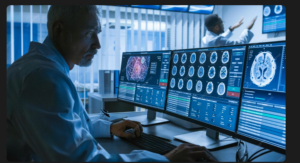Summary:
Table of Contents
ToggleIn traumatic brain and spine injury cases, only neuroradiologists have the specialized training to interpret neuro-imaging with accuracy and confidence. Testimony from other clinicians may be incomplete or misleading. For reliable medical and legal outcomes, attorneys and patients should ensure imaging is reviewed by a certified neuroradiologist.
Table of Contents:
Introduction
Imagine being in court for a traumatic brain or spine injury case as an attorney. The stakes couldn’t be higher as someone’s future, care, and possibly financial stability depend on what the experts say about the victim’s scans. But the question is, who is the expert? Neurologists, psychiatrists, neurosurgeons, orthopedic surgeons, and PM&R Doctors are brilliant in their respective specialties. Still, when it comes to interpreting brain and spine imaging, they don’t have the same depth of training as a neuroradiologist. And in high-stakes scenarios like TBI litigation, that gap matters a lot. Still wondering why the opinion of an expert neuroradiologist is important? Read on to find out!
What Makes a Neuroradiologist Different?
A neuroradiologist isn’t just a radiologist who looks at brain scans; they complete:
- Medical school
- Radiology residency to acquire years of training in all forms of medical imaging, and
- Neuroradiology fellowship, i.e., highly specialized training focused on the brain, spine, and nervous system.
In a nutshell, neuroradiologists with expertise in traumatic brain and spine injury spend thousands of hours interpreting MRIs, CT scans, and other more advanced neuroimaging techniques in major trauma centers, and hone their skills to detect even the minutest abnormalities that others might miss. They are also able to recognize normal findings or artifacts that can be misinterpreted as abnormalities by non-expert radiologists or other clinicians. A neuroradiologist with expertise in traumatic brain and spine injury not only has a deep understanding of how to interpret images but also understands disease patterns, correlates the imaging with symptoms, and predicts outcomes with accuracy and precision.
The Courtroom Problem
In court, credibility is everything. Unfortunately, testimony from non-neuroradiology clinicians often sounds authoritative but may:
- Miss critical findings that a neuroradiologist would catch.
- Overstate or understate injury severity, skewing the narrative.
- Use incomplete or misleading interpretations, especially in complex cases.
When this happens in TBI or spinal injury litigation, the jury and judge might be misled, not out of malice, but because the “expert” didn’t have the right training to begin with.
Conclusion
As per Frontiers, in 2021, there were 20,837,466 cases of head injuries worldwide, with 56.63% moderate/ severe TBI cases. With so many cases revolving around TBI and other neurological disorders, neuro-imaging expertise isn’t just optional; it’s essential. Other clinicians may be brilliant in their fields, but when it comes to interpreting brain and spine scans, only a neuroradiologist with expertise in traumatic brain and spine injury has the training to deliver courtroom-ready accuracy.
Looking for professional neuroradiologists who deliver accurate and unbiased results for improving patient outcomes and supporting legal evidence? Reach out to our team at Neuro Experts, PC today!
FAQs
Can a neurologist interpret my MRI or CT scan?
Yes, but they do not have the same specialized imaging training as a neuroradiologist, which may affect accuracy in complex cases.
Do neuroradiologists only work in hospitals?
No, they work in hospitals, specialized imaging centers, and sometimes as independent experts for legal cases.
Why is a neuroradiologist’s testimony more reliable in court cases?
Because neuroradiologists have advanced expertise in neuroimaging, their interpretations are more accurate, precise, complete, and credible, making their testimony stronger and harder to challenge in legal settings.








